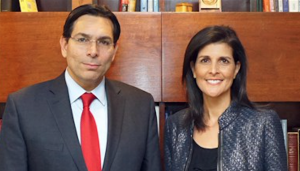
As Trump’s United States Ambassador to the UN takes presidency of UN Security Council in April, Nikki Haley pledges to put a halt to its focus on the Arab-Israeli conflict, and end the body’s obsession with Israel.
By David Rosenberg
The United Nations Security Council has a new Council President this month.
United States Ambassador to the UN Nikki Haley will preside as President of the Council, a position which rotates within the 15-member body each month. Haley assumed control of the council from Matthew Rycroft of Great Britain, and is slated to hand off the position to the representative of Uruguay in May.

Israel’s UN Envoy, Amb. Danny Danon Met with US Ambassador Nikki Haley – Photo: U.S. Mission to the UN
Upon assuming the position, Ambassador Haley made clear at a press conference Monday evening that the US would no longer allow the UN Security Council agenda to be dominated by the Israeli-Arab conflict.
“So much has been put towards Israel and the Palestinian Authority and not enough has been put towards some of these other issues,” Haley said. “That is our goal for the Middle East open debate.”
Haley also revealed that she had warned Palestinian Authority representative Riyad Mansour that the US would block Arab-backed motions at the UN Security Council directed at Israel and called upon the Palestinian Authority to show “genuine willingness” to return to the negotiating table.
“My conversations with the representative of the Palestinian Authority was very much that… we want them to move towards coming to the table. I told him that… we weren’t going to support the Palestinians’ actions here at the UN until they came to the table. We need to see some genuine willingness to come to the table.”
“We don’t want to see any additional measures brought at the UN that would bash Israel or lift up the Palestinian Authority until we can get these negotiations to happen. And I do think that the discussions that have happened at the UN have been more of a hindrance towards the peace process than it’s been a help, because it’s caused defensiveness to happen.”
While the Trump administration has already committed itself to using America’s veto power at the UN Security Council to block lopsided anti-Israel resolutions, the Ambassador to the UN says the US will also work to change the body’s agenda, ending the decades-long focus on Israel.
During Monday’s presser Haley also discussed the Trump White House’s efforts to reach a final status agreement between Israel and the Palestinian Authority, including special envoy Jason Greenblatt’s recent trip to the region and meetings with both Israeli and Palestinian Authority leaders.
Haley said the special White House envoy was “exploring” all options, but that the administration was hoping to extract compromises from both sides. The Ambassador also said that President Trump’s son-in-law and Senior Advisor Jared Kushner was already involved in the process and had done “great work”.
“I’ve been in communication with Jason [Greenblatt] a good bit in terms of his workings and dealings in Israel and also visiting with the Palestinians. I know that we are strongly working towards a peace agreement between the two areas.”
“But Jason is exploring everything. This is all with open eyes to see what can we do, how can we get things done, and trying to get both sides to bend a little bit. That’s the key; how do we get both sides to bend towards the common good. And Jason has done great work with that. I think you’ve seen Jared [Kushner] do great work with that, and I think you’re going to see that the president’s involvement in that as well.”
Regarding the Israeli Security Cabinet’s decision on Thursday to approve construction of a replacement town for Amona evictees in Samaria, Haley criticized the move and suggested Prime Minister Binyamin Netanyahu himself was distancing himself from the decision.
“We have said that we do not think it’s helpful to continue with settlement expansion. I did read something where Netanyahu is trying to roll that back so that that’s not an issue. My hope is that we have willingness from both sides coming together to really allow for that conversation to take place, but we’ve been very clear that we don’t think it’s helpful at this time and we’d like to see a pause on that.”
View original Arutz Sheva publication at:
http://www.israelnationalnews.com/News/News.aspx/227725






 Israeli New Shekel Exchange Rate
Israeli New Shekel Exchange Rate